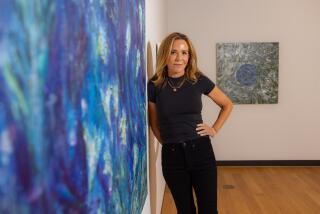Remembering a Sunset in Monterey
- Share via
In the memory world of Grace Jacobian, the colors of a Monterey sunset paint the sky.
They are brilliant streaks of reds and oranges over an ocean white-tipped with waves.
A fading yellow sun burns down a distant horizon, and the gray shadow of a cloud drifts along the beach.
It was a sunset in 1940. She was young and pretty then, and her marriage to Stephen Jacobian was new. Her world was a warm place to be.
“We were so in love and it was so romantic,” she says, her head cocked slightly and a finger pressed pensively to her cheek. “I can remember everything about it. I had a special feeling when I painted this.”
The work she refers to is a print of the sunset that glowed in the sky more than half a century ago. The colors are a careful reproduction in ink.
Now almost 90 and a widow, Grace Jacobian relies on memory, and the kindness of friends, to re-create in art the sunset she once saw over Monterey Bay.
It comes back to her clearly, because her mother told her once a long time ago to be aware of her world, to imprint the sights on her memory, to absorb her surroundings through every pore.
The advice serves her well today. Jacobian never will see another sunset to paint. Memory is all she has left. She’s totally blind.
*
I met her in an art studio at the Braille Institute, an imposing series of buildings off the Hollywood Freeway.
It was here, when her world went black, that she turned to art experts to develop a talent to paint she never knew she had. It was therapy at first. Now it’s her life.
A frail, white-haired woman, she shows her prints and paintings proudly and asks whoever studies her work, “Tell me what you see.”
I see that sunset in one painting, full of warmth and dazzling colors, a sunflower in another, hard yellow against a blue sky, and a firebird emerging from an explosion of color in another.
I see what she once saw, tailored by her emotions, filtered through her memory, and they are impressive indeed.
Her work is occasionally displayed in public, most recently at the Bridge Gallery in the walkway that connects the two buildings of City Hall, but it isn’t applause that Jacobian is looking for.
It’s an affirmation of the life she once knew, when sunsets and sunflowers dazzled her sight. It’s a warm and reflective wave to her past.
Jacobian went blind five years ago when massive hemorrhages took her slowly into darkness. “I have no day and no night,” she says in a tone without rancor. “A talking clock tells me the time. I see blackness.”
She pauses for a moment and then says, as though at that very second she has just realized it, “I have no idea what this room looks like.”
Instructors at the Braille Institute hand her the colors she asks for when she creates her works of art. Talent and memory take over from there. Once a theatrical costume designer, she often uses fabrics to enhance her prints. Their texture is an element of memory.
“Art,” an instructor says, “frees her.”
*
Born in a small town in Pennsylvania, Jacobian left school in the eighth grade to help support a family of five children. She moved to L.A. in 1927 and met and married Stephen. He died in 1957. She lives with a sister now.
Jacobian has traveled the world many times, through Turkey and Greece and France and Russia, and relies on the memory imprints of what she saw to fuel her work.
“I miss seeing things,” she says. “I can remember a lot. But it just isn’t the same.”
Our senses complete us, and to be without any one of them cripples us in ways we can’t imagine. We turn to other abilities when a single sense falters or dies, the way Jacobian turned to memory.
Her story holds special meaning for me. A few weeks ago, my ability to hear was suddenly cut in half. A virus had badly damaged the nerves in my left ear, and it was uncertain if I would ever regain my full hearing.
I began to wonder what would happen if the affliction were total, if my hearing went completely. Could I hear again in my mind the voices of those I love? Would I remember music the way Grace Jacobian recalls that sunset in Monterey? Would I be able to write the way she paints?
Most of my hearing eventually did return, and now I heed the sounds of my life with special care. I listen. I absorb.
We’re all flawed in different ways. Grace Jacobian, whose art takes her to a world beyond blindness, is one of the lucky ones. She has a sunset to remember.






